UCAT Preparation Course
Matrix UCAT Courses are designed to teach you the theory and exam techniques to acing the UCAT test.
Learning methods available
Select a year to see available courses
Afrina shares how she prepares for half-yearly exams to ace Year 11! Read on to see her hacks for exam success.

Join 75,893 students who already have a head start.
"*" indicates required fields
You might also like
Name: Afrina Tanisha
School: St George Girls High School
Grade: 11 (2022)
ATAR goal: 99.75
University goal: Doctor of Medicine, University of New South Wales
Hi! I’m Afrina and I’ve been a student at Matrix ever since Year 7!
In fact, my world has been shaped through the constructs of school, home and Matrix.
I’ve made some of the best memories at Strathfield Campus, made life long friends and most importantly learnt to love learning.
I realised my love for Poetry in English classes and have been writing my own collections. I also really like to read and lately have been pushing myself to read a few postmodernist works. They’ve been interesting to read about (and not going to lie kind of difficult).
Year 11 has definitely been challenging at times. After working really hard, and not getting the results that I expected, it’s been a test to my resilience. It is often very easy to get swept up in the stressful aspects of study, so that’s why I like to unwind by playing badminton.
I also love listening to music; Spotify has been my saviour this year. It’s helped me concentrate with binaural beats and helped me just relax by listening to my favourite artists.
Overall, Year 11 has been flying by so quickly and I am just taking in every moment.
It’s definitely my best subject.
I love understanding the different ways that reactions occur, and how these are essential for everyday life. It’s a super interesting subject, that probably has more exceptions than actual proper rules. It challenges me to think with logic and improves my problem-solving skills.
This is one of my favourite classes to go to. In English Extension, we have been studying a key canon text called ‘The Illiad’ by Homer. Studying the stories of Ancient Greece to see the different relationships develop. As the plot progresses, I’ve been able to form more critical analysis skills.
I also like to discuss the themes of the texts, and often my class gets really philosophical and delves into the constructs of humanity.
Taking this subject has been improving the way I holistically analyse literature.
I have been able to acknowledge that there are a number of different perspectives of judgement that I can have while reading.
Maths used to be my best subject. However, I did not have enough time to actually digest the information throughout the fast pace of Year 11.
My exam performance has also been impacted by time pressure as I often get frazzled or anxious during the exam.
It turned out that my key weaknesses were that:
First, I practised a greater variety of questions and carefully took the time to grasp key concepts (such as trigonometry) at my own pace with Matrix+.
I also noticed that the Matrix Theory Books had some great questions in the lesson reviews, so I have been revising with the different lesson review questions.
To solve my issues with time and nerves during exams, I knew I had to practice more.
The number one tip to improve on time pressure and nervousness is to do timed exams.
In addition, I made the effort to wake up early in the morning, to sit down and take the practice tests as if it was a real exam.
My brain started getting used to working at 9 in the morning and I noticed myself becoming more productive at that time. As a result, I had been finishing the paper on time. Now, I know that at the very least, time is something I have under control, which has really helped with my exam-time nerves.
My love for physics is infinite but my marks have not been reflective of this love. I find it a bit difficult to apply theory content whilst being specific about how different processes work. You can lose marks easily by missing a few details, and since my application was poor, I had trouble responding to difficult questions.
So, I made an effective plan to address these weaknesses.
Here’s my 4-step process to achieving my Physics goals:
| Step | Objective |
| 1. Read the syllabus | Understand the course requirements for top performance |
| 2. Learn theory | Gain an in-depth knowledge and understanding of key Physics concepts |
| 3. Practise with quizzes | Evaluate the clarity and depth of your understanding of key physics concepts. |
| 4. Stimulate the exam | Gain exposure to exam style questions and test my exam readiness |
Year 11 has forced me to reassess the way I study. I had to find new ways to process concepts and to develop a concise understanding of the content. This has been a mix of failing, reorgainsing, readjusting with changes and learning how to improve my skills.
The first thing I did in an attempt to improve in my half-yearlies is to make sure I have everything planned out and know exactly how I am going to execute it on time.
Setting goals is important but making sure they are achievable is also an something to take into consideration.
In the past, I got caught up trying to do everything at once, but that made me tired and decreased my level of concentration in my work.
So now, I strategise how I am going to get all the work I need to get done for my half-yearlies by categorising all my tasks as either Small or Big.
Small Tasks
|
Quick and achievable tasks like homework, quick quizzes or revising theory → should take approximately 30-45 minutes to complete |
Big Tasks
|
These tasks take longer to do but I like complete them in small chunks. For example, I dedicate a few sessions to practice tests. The first session is completing the actual test itself, takes 2 hrs to complete. The second session is when I take an hour to review the test and mark it. |
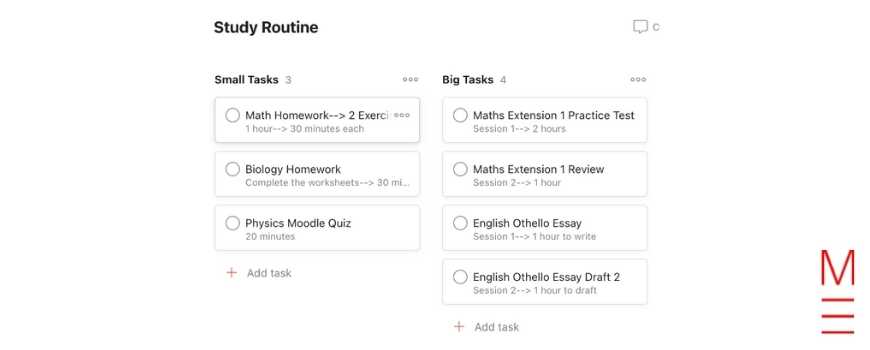
Every time I receive an assessment notification from school, the first thing I do is go and highlight the syllabus dot points. I make sure to break them down and check if my study notes have been completed for each dot point.
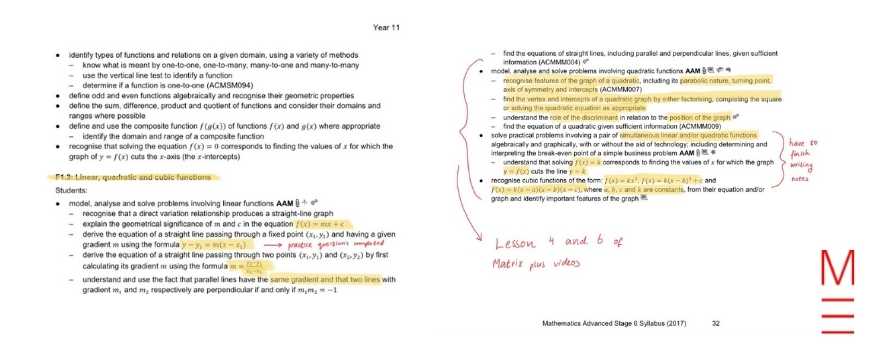
I had to save time over the term to study for my half yearlies, so I had to utilise the holidays in the most effective way possible. Matrix Holiday Accelerated courses helped me get ahead and stay on track.
Chemistry is one of my favourite subjects, I understand the content easily and enjoy learning it. So, I did the holiday course to get ahead for school. I found it helpful to solely focus on one subject and really pay attention to the modules. The Chemistry Holiday Course went through a whole module in 5 days, which definitely maximised my productivity because I forced myself to write notes everyday.
By the end of the five days, I finished my notes for Module 3 Chemistry. I like that by completing this course during the holiday, I have more time to revise other content and weaker subjects during the term.
I’ve definitely been experimenting with different methods of studying to find the one that works for me. Normal note-writing (just writing across the page) has been more difficult because it is time-consuming and I felt like nothing was going into my head.
While it may work for other people, after many years of using that method, it was not working for me anymore. So, for my half yearlies I thought it would be a great idea to try out the visual learner approach.
It completely transformed how I wrote notes and made a style that was accustomed to my method of learning.
Here’s some of the approaches I take to create visual notes.
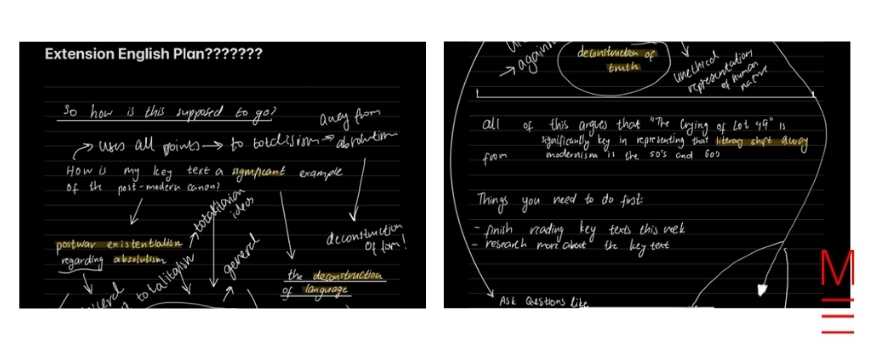
The mind map strategy is an effective way to learn and scatter out ideas. I used this strategy for more creative subjects like English and also used it for Chemistry too. Sometimes I have writer’s block and don’t know where to start with assignments, and this leads to procrastination.
The mind map approach helps me just start writing ideas on a blank canvas, and just write a few thoughts here and there. Then eventually connecting everything together with arrows and that led to a whole draft of an essay.
I learned this tip from another Matrix Alumni, James Drielsma, to use flowcharts to organise thoughts. Here’s his blog!
I found this incredibly useful and also noticed that many of the Matrix Theory Books also use flowcharts to explain concepts. They summarise concepts and explain how you can demonstrate skills needed for different questions with a step-by-step process.
This makes note-making easier, less time-consuming and more effective for learning.
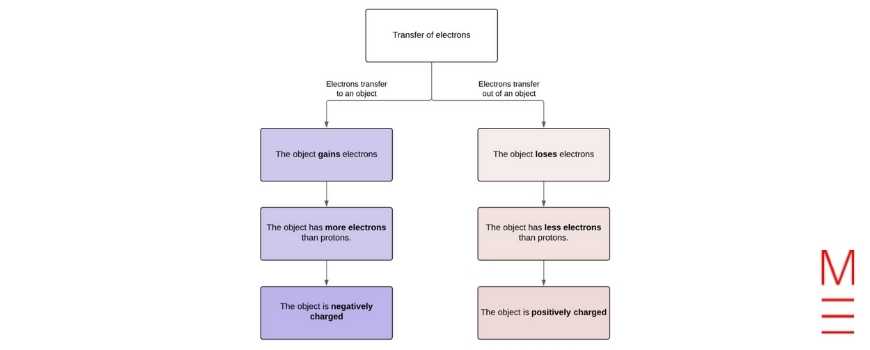
For my half yearlies, I needed to remember a lot of things so I thought it would be helpful if I put up little reminders of some things I had difficulty remembering. I would write things like equations, different rules for maths and laws I needed to remember around my room. I would see them every day, and they stuck to my memory.
There is this amazing site, THSC Online, that I use to access practice tests online. It is a life saver and I hope that everyone can utilise this site for the best.
This website has practice tests for Maths, Science and Social Science subjects and is a great tool to find resources. It has different practice tests from all schools over NSW, and allows for students to have larger exposure to different styles of questions.
For my half-yearlies I was dependent on this site and did at least one practice test for each of my subjects. This accentuated my time management during exams, identified my weaknesses and places I needed to work on and helped me get used to the exam setting.
My top tip is to use practice tests as the main tool to excel in the half yearlies- or in any test.
After every practice test, I take at least 30 minutes to review the tests and see the places I made mistakes. I annotate the tests, marking the places where I went wrong and how to improve, so I make sure I don’t do it again.
I have a Fail book. Don’t worry it’s not a place where I bring down my self-esteem. Its other name is the First Attempt in Learning Book, and I utilise it to the best of my ability. Here’s a snippet of my Fail book, and I’ll explain what I do with it.
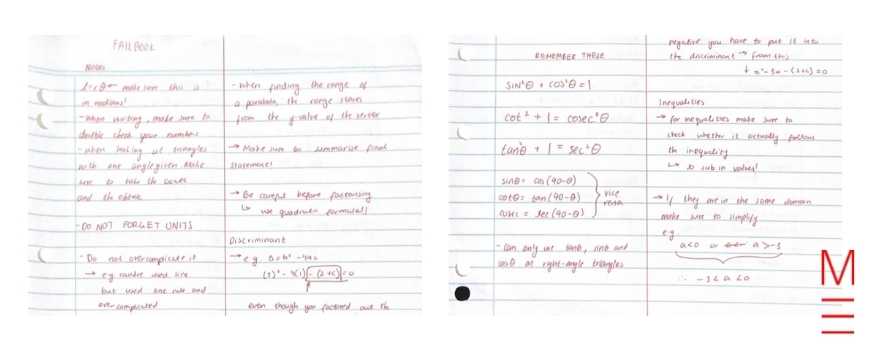
I use a red pen because that colour sticks to my head the most. It’s like a warning, “don’t make the same mistake twice”.
I circle the questions where i made mistakes in the practice exams. Then I identify certain things like equations, formulas and different rules that I may have forgotten and write them down. I also give myself different memory notes like “do not forget units” or “Be careful when factorising”.
This is the best way to revise my mistakes, so I don’t do them a second time. This has definitely been a great method to help me in my half-yearlies and very useful to revise before my exams.
I get carried away with ranks and marks sometimes. But the important thing to note is continual improvement is the best thing to happen. No one can stop a person that continually improves from achieving greatness
I had a lot of things on my plate to get done, but i had to priortise the more important things. In the end I got the best out of studying sessions.
Even after I studied hard and put all my effort into a test. I sometimes did not get the marks I wanted to achieve. So having resilience and adapting with change is important.
Written by Guest Author
We have regular contributions to our blog from our Tutor Team and high performing Matrix Students. Come back regularly for these guest posts to learn their study hacks and insights!© Matrix Education and www.matrix.edu.au, 2023. Unauthorised use and/or duplication of this material without express and written permission from this site’s author and/or owner is strictly prohibited. Excerpts and links may be used, provided that full and clear credit is given to Matrix Education and www.matrix.edu.au with appropriate and specific direction to the original content.